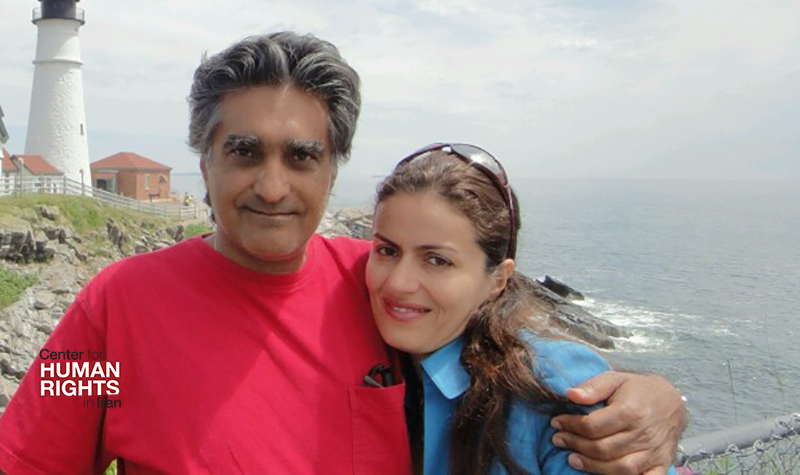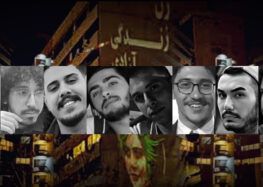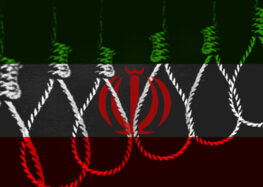Iranian-American Zoroastrian Denounces 27-Year “Unjust” Prison Sentence in Letter From Prison

Update: The couple’s sentence was later reduced to 15 years for Karan Vafadari and 10 years for Afarin Nayssari.
In a letter from Evin Prison obtained by the Center for Human Rights in Iran (CHRI), Iranian-American dual national Karan Vafadari has denounced the “unjust and tyrannical” 27-year prison sentence he was issued in Tehran along with his Iranian wife, Afarin Nayssari, who was sentenced to 16 years in prison.
The charges against Vafadari and Nayssari (who has US permanent residency) have not been officially publicized. But in a letter dated January 21, 2018, Vafadari said he was sentenced “last week” at a Revolutionary Court in Tehran for being a Zoroastrian dual national.
“The court has granted me the honor of being the first Iranian to be convicted under Article 989 of the Civil Penal Code… It means my wife and me, and every one of you dual national Zoroastrians who returned to your country to invest in the homeland you love are always going to be in danger of losing your assets and being forced to leave the country,” wrote Vafadari.
According to Article 989: “In case any Iranian subject acquired foreign nationality after the solar year 1280 (1901-1902) without the observance of the provisions of law, his foreign nationality will be considered null and void and he will be regarded as an Iranian subject. Nevertheless, all his landed properties will be sold under the supervision of the local public prosecutor and the proceeds will be paid to him after the deduction of the expenses of sale.”
The law also exempts these dual nationals from running for public office.
“Unfortunately, my international activities [in the art world] raised the suspicions of the IRGC’s Intelligence Organization,” added Vafadari. “Fortunately, the initial, baseless security accusations that led to our arrest were dropped, but our gallery, office, warehouses and home remained locked and our cars, computers and documents were confiscated, followed by accusations and interrogations that indicated a deeper plot.”
Vafadari wrote that his sentence, issued at Branch 15 of the Revolutionary Court in Tehran by the notoriously hardline Judge Abolqasem Salavati, includes 124 lashes and a fine of nine billion rials ($243,000 USD).
“Being a dual national is no longer a source of pride but a liability that could lead to your prosecution under the obsolete Article 989,” added Vafadari, who lives in Tehran with Nayssari.
Iranian attorney Mahmoud Alizadeh Tabatabaee told CHRI on January 30 that Article 989 only applies to individuals who have renounced their Iranian nationality. Vafadari and Nayssari have not renounced their citizenship.
“In my 25 years of experience I have never encountered a single such case,” said Tabatabaee.
Property Confiscations
Vafadari belongs to a prominent Zoroastrian family known in Tehran for their endowment to the city’s Firoozgar Hospital. Recognized in the Constitution, followers of the ancient, pre-Islamic Zoroastrian faith have lived in Iran for thousands of years but are subject to discrimination.
In his letter, Vafadari wrote that before he was arrested, he was actively trying to regain some of his family’s confiscated assets through the Iranian legal system.
“Despite the chaos in the early days of the [1979] revolution, and even though my mother spent nine months in the same ward I am being kept in now, our family’s love for the land of our ancestors’ was so strong that they did not leave the country when more than half of our agricultural lands were confiscated in the name of khoms [Islamic tax] and more assets were taken away from us for different reasons,” he wrote.
In a letter to Supreme Leader Ali Khamenei dated December 2, 2016, Karan Vafadari’s sister, Kateh, noted that the couple had been arrested “to fabricate a case for the purpose of extortion and property seizure.”
The Islamic Republic has a documented history of unlawfully confiscating private property.
“We should talk about this case and reveal what has happened to Vafadari,” Koorosh Niknam, a former representative of the Zoroastrian community in Iran’s Parliament, told CHRI on January 30, 2018.
“His assets have been confiscated. What was his crime? They say they found wine in his home and he was in contact with foreign ambassadors. That cannot be the basis of such a heavy sentence,” he added.
Dual Nationals in Iran
Vafadari and Nayssari, art gallery owners in Tehran who are prominent in the Iranian artistic and cultural community, were arrested by the Islamic Revolutionary Guards Corps’ (IRGC) Intelligence Organization at Tehran’s Imam Khomeini International airport on July 20, 2016.
Two weeks later, Tehran Prosecutor Abbas Jafari Dolatabadi stated that “two Iranian dual nationals” had been charged with organizing mixed-gender parties for foreign diplomats and their Iranian associates and serving alcohol at their home.
According to the Constitution, Zoroastrians in Iran are not subject to Islamic laws on alcohol and mixed gatherings.
In March 2017, new charges were brought against the couple, including attempting to overthrow the Islamic Republic and recruiting spies through foreign embassies.
In recent months, the issue of dual nationals living in Iran has become a matter of public discussion in the Iranian Parliament.
“The Iranian nationality of people with dual nationalities will not be nullified, rather, their foreign nationality will not be recognized,” said Hossein Naghavi Hosseini, the spokesman for the Parliamentary Committee for National Security, on January 7.
Vafadari’s Warnings to Iranian Zoroastrians
Writing about the discrimination suffered by Zoroastrians in Iran, Vafadari pointed to the case of Zoroastrian council member Sepanta Niknam, who was suspended from the city council in the city of Yazd in September 2017 for his faith.
Iran’s Guardian Council has declared that religious minorities should not be allowed to run for office in Muslim-majority districts. Despite this, one of its members has stated that in some ways, religious minorities in Iran have it better than the country’s Muslim-majority population.
“According to [Guardian Council member] Ayatollah Modarresi Yazdi, the benefits granted to minorities by the Islamic state have no precedent in the world and, for their private use, they can enjoy some the things that are banned for Muslims,” wrote Vafadari.
Vafadari, who as a Zoroastrian is allowed to keep alcohol in his home, added: “I don’t recommend that you make wine at your own home. I thought this was not illegal for the Zoroastrians who have had wine in their culture for more than 5,000 years. For this, I have been given a year and a half in prison, condemned to 74 lashes and fined 140 million tomans ($38,000 USD).”
“Secondly, don’t accept alcoholic drinks as gifts from your friends and foreign diplomats, even if they brought them into the country from legal customs’ channels, because you could also be sentenced to three years in prison and a six billion rial ($162,000 USD) fine, like I have,” he added.
“Thirdly, with the approaching festivities such as the new year [March 21], I implore my fellow Zoroastrians to act cautiously for their own good,” continued Vafadari. “The reason is that holding mixed [gender] gatherings, which are very normal for us… will be seen as promoting indecency and they will sentence you to 15 years in prison for so-called corruption and depravity like I have.”
Vafadari also criticized Zoroastrian MP Esfandiar Ekhtiari for failing to prevent his prosecution.
He wrote: “In the end, I should say that if you get entangled in a legal misunderstanding, or if you refuse to ‘cooperate’ with the authorities and are chosen for a ‘hot branding,’ in the words of a judicial official, aimed at discouraging others, do not have expectations from anyone, not even Mr. Ekhtiari, the honorable representative of the Zoroastrian community in Parliament.”
“Unfortunately, he is overlooking the violations of my rights as a citizen during the judicial process under interrogation and after,” he added.
*This article was updated on January 30, 2018, with additional quotes from Karan Vafadari’s letter.






